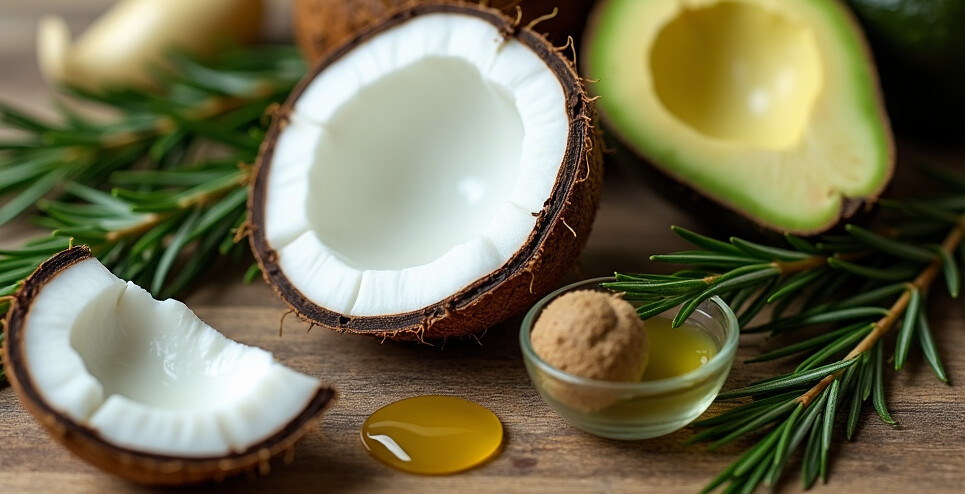I have often noticed that thinning hair can affect not only appearance but self-confidence as well. Natural remedies offer a practical solution for those looking to restore hair health without relying on harsh chemicals. In this article I share my insights on how natural ingredients and simple lifestyle changes can help revitalize thinning hair.

Understanding Thinning Hair Problems
Thinning hair can result from many factors including genetics, stress, and nutritional deficiencies. I have learned that understanding the cause is the first step in choosing an appropriate remedy. Changes in hormone levels, inflammation, and even diet issues can contribute to hair loss. Research has linked deficiencies in vitamins such as vitamin D and Biotin to thinning hair. A study published in the International Journal of Trichology points out that low levels of vitamin D might be associated with hair shedding.
Even with the variety of causes, there is hope for many experiencing this condition. Natural remedies work gradually to improve the strength and vitality of your hair. It is interesting to note that simple lifestyle adjustments and home-based treatments can lead to noticeable improvements over time.
When I first started checking out natural methods, I was surprised by how many effective ingredients are available right in our kitchens and gardens. I found that using soothing treatments such as aloe vera or nourishing oils can tie together a routine that supports hair growth from the scalp outwards.
Natural Remedies to Revitalize Your Hair
There are several natural remedies that I believe play a key role in addressing thinning hair problems. Each remedy has unique properties to step up hair health and promote a stronger, fuller appearance.
Scalp Massage: A simple scalp massage not only feels relaxing but also boosts circulation to the hair follicles, which may promote hair growth. Research suggests that increased blood circulation can improve nutrient delivery to the scalp (Journal of Dermatological Treatment). I regularly incorporate a five-minute scalp massage with gentle pressure to wake up the hair roots.
Aloe Vera: This natural ingredient has soothing and moisturizing properties that can help calm an irritated scalp. It has enzymes that may promote healing and stimulate hair growth by reducing inflammation. Studies indicate that aloe vera might also help improve the overall condition of the skin, providing a better environment for hair follicles (Journal of Ethnopharmacology).
Coconut Oil: Rich in medium-chain fatty acids, coconut oil penetrates the hair shaft to reduce protein loss. Applying a small amount on the scalp can lock in moisture and improve hair strength. I have often used coconut oil as a pre-wash treatment to help protect the hair during shampooing.

Rosemary Oil: Known for its stimulating properties, rosemary oil has been studied for its potential to increase hair count. Some research suggests that rosemary oil may perform as well as minoxidil in certain cases (SKINmed). I like to mix a few drops with my carrier oil and massage it into my scalp a couple of times a week.
Onion Juice: Though it may not sound appealing at first, onion juice contains high levels of sulfur. This element is known to support collagen production and, consequently, hair regrowth. A study in the Journal of Dermatology noted that topical application of onion juice improved hair regrowth in patients with patchy alopecia areata. I advise using it sparingly and rinsing thoroughly to avoid lingering odor.
Peppermint: Peppermint oil provides a cooling sensation and helps increase the flow of blood to the scalp. Its antibacterial properties have been recognized in various studies. I find that a diluted solution of peppermint oil can invigorate the scalp, making it a refreshing addition to a weekly hair care routine.
Essential Oils: Besides rosemary and peppermint, several essential oils can aid in treating thinning hair. Oils like lavender and cedarwood have been used in various hair treatments. Their combined use in a diffuser blend for hair care has shown promise in anecdotal reports. I blend different essential oils with a carrier oil to create a custom treatment that suits my hair type.
Boosting Hair Health with Nutritional Support
A natural hair care regime also involves proper nutrition. Healthy hair often reflects a balanced diet. I often recommend incorporating supplements, particularly Biotin and multivitamins, for those who suspect a dietary gap is affecting their hair health.

Biotin: Also known as vitamin B7, Biotin is a well-known nutrient for hair, skin, and nail health. Research indicates that a Biotin deficiency may contribute to hair loss. I rely on foods rich in Biotin, such as eggs, nuts, and legumes, along with supplements if recommended by a healthcare professional.
Multivitamins: Supplementing with a daily multivitamin ensures that you cover essential nutrients that might be missing in your diet. Deficiencies in vitamins like D, certain B vitamins, and even iron can contribute to hair thinning. A study in the American Journal of Clinical Nutrition emphasizes that a balanced micronutrient intake supports overall hair health. I make it a habit to check my nutrient levels and adjust my diet or supplement routine as needed.
It is commonly asked which vitamin deficiency causes hair loss. In my experience and supported by research, deficiencies in vitamin D and Biotin are linked to hair thinning, while inadequate iron levels may also play a significant role. I recommend discussing with a doctor who can run tests to also detect any vitamin or mineral deficiencies that might be affecting your hair.
Lifestyle Adjustments for Promoting Hair Health
When it comes to improving hair health, combining natural remedies with lifestyle changes can make all the difference. From topical treatments to dietary adjustments, aligning your routine with practices that nourish your body can help you support hair regrowth and reduce thinning.
Here’s a breakdown of the science and practical steps I’ve found to be effective in fostering a healthier scalp and stronger hair.
The Science Behind Hair Regrowth
For many people experiencing thinning hair, the biggest concern is whether it will ever grow back. The good news is that scientific studies back up the idea that a combination of natural treatments and proper nutrition can stimulate regrowth, especially in the early stages of thinning.
- A review published in Clinical, Cosmetic, and Investigational Dermatology shows promise for natural remedies and nutrition in encouraging hair regrowth.
- Regular use of scalp massages and nutrient-dense diets can help slow down thinning and promote new growth.
My Daily Routine for Hair Health
Over time, I’ve found that consistency is key when it comes to hair care. Here’s how I’ve incorporated natural remedies into my daily routine:
- Coconut oil + Essential oils: I mix coconut oil with a few drops of rosemary and peppermint essential oils. These oils have been shown to stimulate the scalp and promote hair health.
- Aloe vera: After treatments, I apply aloe vera to soothe my scalp. The natural enzymes in aloe vera support scalp health and balance oil production.
These remedies are best used consistently—when done regularly, they work together to create an optimal environment for hair regrowth.
Supporting Hair Health from the Inside Out
While topical treatments are great, nutrition and stress management play a crucial role in hair health as well. Here’s how I make sure my body is supporting my hair’s growth:
- Balanced Diet: Eating a nutrient-rich diet is essential. Focus on foods that support hair health, like those rich in vitamins, minerals, and protein.
- Supplements: I take a multivitamin to fill in any gaps in my diet, ensuring my body has everything it needs to promote hair growth.
- Stress Management: Chronic stress can lead to telogen effluvium, a condition where hair prematurely enters the shedding phase. To keep my stress in check, I make time for:
-
- Meditation
- Regular exercise
- Getting enough sleep
These practices not only help my hair but improve my overall well-being too.

Extra Tips for Long-Term Hair Vitality
Every person’s hair responds differently, so it’s important to be patient and willing to experiment with different methods. Over time, I’ve found these simple, yet effective practices to make a real difference:
- Test and adjust: What works wonders for one person might need some tweaking for another. Try new methods, and don’t get discouraged if results take time.
- Weekly hair masks: For added nourishment, I use a DIY hair mask made of honey, yogurt, and olive oil. These ingredients provide moisture and strengthen hair.
- Stay hydrated: Drinking plenty of water helps maintain overall health, which directly supports hair regrowth.
- Sleep: Getting 7–8 hours of sleep is crucial for your body’s natural healing and regeneration, including hair health.
Healthy Hair Practices to Incorporate
It’s not just about what you put on your hair but how you care for it on a daily basis. Here are some simple changes I’ve made that have had a lasting impact:
- Minimize heat styling: Heat tools can cause damage over time, so I focus on air-drying my hair whenever possible.
- Avoid harsh chemicals: I use gentle, sulfate-free products that don’t strip my hair of its natural oils.
- Exercise regularly: Physical activity improves circulation, which is essential for delivering nutrients to the scalp.
Routine Health Check-Ups
It’s also important to monitor your health regularly. I schedule periodic check-ups with my healthcare provider to track things like nutrient levels (e.g., iron, biotin) to make sure my diet and supplement routine are on track.
Frequently Asked Questions
I have received several questions about natural remedies for thinning hair. Here I offer some clear answers based on both personal experience and scientific research.
Question: What is the best natural remedy for thinning hair?
Answer: There is no single remedy that works for everyone. Many find that a combination of scalp massage, aloe vera treatment, and coconut oil application offers significant benefits. These remedies help stimulate the scalp and nourish hair follicles naturally.
Question: How can I fix my thin hair naturally?
Answer: I recommend establishing a routine that includes regular scalp massages combined with natural oils such as rosemary and peppermint. Stepping up your diet with Biotin and multivitamins can also support hair restoration. Adjustments to reduce stress and improve overall nutrition further help address thin hair naturally.
Question: Can hair grow back from thinning?
Answer: In many cases, hair can grow back, especially if the thinning is in its early stages or caused by reversible factors like nutritional deficiencies or stress. Consistent use of natural remedies along with proper care can encourage regrowth, though results may vary from person to person.
Question: Which vitamin deficiency causes hair loss?
Answer: A deficiency in vitamin D and Biotin (vitamin B7) has often been linked to hair thinning. Some people also experience hair loss from a lack of iron and other essential nutrients. I recommend consulting a healthcare professional who can confirm any deficiencies through testing.
Final Thoughts
Natural remedies offer a gentle, accessible approach to improving hair health. Simple practices like scalp massages, and using aloe vera, coconut oil, and rosemary oil can gradually make a difference.
Internally, supporting hair health with biotin, multivitamins, and a balanced diet addresses underlying causes of hair loss. Research backs these natural practices, making them a holistic alternative to harsh treatments.
While results take time, consistency is key. Each step—whether a soothing scalp massage or thoughtful dietary changes—contributes to healthier hair.
Natural methods may work slowly, but with patience, they can restore not just your hair, but your confidence. Stay informed through new research and expert advice, and consult with healthcare professionals to make the most of these remedies.
Remember, hair care is a journey of small, steady steps—so take it one day at a time.

This was such an informative and empowering read, Rebecca, thank you for sharing both the research and your personal experience so generously. It’s refreshing to see natural remedies explained in a way that feels both realistic and science-backed. The way you connect daily practices like scalp massage and dietary choices to long-term hair health really made me reflect on how interconnected our overall wellness is with something as visible as our hair.
One thing that stood out to me was how many of the solutions are already within reach, like aloe vera, coconut oil, and nutritional shifts. It made me wonder: how often do we overlook simple, consistent habits in search of “instant fixes”? Also, I’m curious: have you found any particular remedy or combination of remedies that works better for specific hair types (e.g., curly vs. straight or oily vs. dry scalps)?
And one more question: how long would you typically recommend trying a natural routine before expecting to see any noticeable changes in hair thickness or strength?
Thank you again for this beautifully written and practical guide. I’m inspired to revisit my routine with more intention.
Thank you Juan, I’m gald that the article was informative.
It’s easy to overlook simple, natural solutions like aloe vera, coconut oil, or even dietary shifts, especially when we’re conditioned to seek quick fixes. In a world of instant gratification, we often forget that consistent, small habits can yield lasting results. The key is patience and understanding that natural remedies work gradually, not overnight.
Different hair types may respond better to specific remedies:
Curly Hair: Needs moisture. Coconut oil and aloe vera can hydrate and define curls without weighing them down.
Straight Hair: Light oils like rosemary oil are great for boosting scalp circulation without making the hair greasy.
Oily Scalps: Opt for lighter oils and avoid heavy treatments. Tea tree oil and rosemary can help balance oil production.
Dry Scalps: Rich oils like coconut oil and argan oil can provide deep moisture.
Typically, you should give a natural routine 3–6 months for noticeable changes in hair thickness or strength. Hair growth is slow, and consistency is essential for seeing results. Don’t be discouraged by slow progress—your patience will pay off!